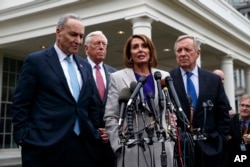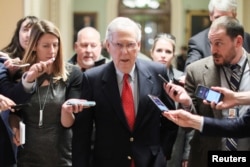A partial U.S. government shutdown showed no sign of ending soon Friday as White House and congressional aides prepared to work through the weekend to try to resolve a stalemate over funding for U.S. President Donald Trump's proposed U.S.-Mexico border wall.
Trump said he'd had a "very productive" meeting with congressional leaders to try to end the shutdown, which was triggered by disagreement over $5.6 billion in funding to build the wall.
But Democratic congressional leaders characterized the White House meeting differently.
House Speaker Nancy Pelosi, who assumed leadership of the newly sworn in House Democratic majority Thursday, called the almost two-hour meeting "contentious." She continued her oft-repeated assertion that agreement on the wall's funding "cannot be resolved until we open up the government."
Senate Democratic leader Chuck Schumer told reporters the president threatened to keep the government closed for "a very long period of time, months or even years."
Despite comments from the Democratic lawmakers that little progress was made, Trump said that "we're on the same path" to reopen the government. He touted the benefits of "a solid steel or concrete structure" along the border.
The White House said talks on the funding impasse with House and Senate staff members were set for 11 a.m. EST Saturday.
Vice President Mike Pence, Homeland Security Secretary Kirstjen Nielsen and adviser Jared Kushner have been chosen to work with the congressional delegation.
WATCH: Trump, Lawmakers Again Fail to End Shutdown
'We're not doing a wall'
The House passed a bill Thursday to reopen shuttered federal government agencies. The measure did not, however, include the $5.6 billion the president has demanded for the wall.
"We're not doing a wall," Pelosi vowed Thursday. She suggested that the money could better be used for improving border security technology and hiring more border agents.
However, Senate Majority Leader Mitch McConnell called the House plan to end the shutdown "political theater."
The Senate passed an identical bill last month, while Republicans still controlled both chambers of Congress.
The legislation passed Thursday in the House called for the reopening of the federal government and the funding of the Department of Homeland Security (DHS) until early February.
While Trump himself has not used the word "veto," other White House officials have. One official said the president told Democratic leaders he would "look foolish" if he ended the shutdown.
Trump is blaming Democrats for the current situation after insisting on Dec. 11 he would be "proud" to shut down the government if his demand for wall funding was not met.
On Friday, in response to a reporter's question, Trump defended that comment. "I'm very proud of what I'm doing," he said. "I don't call it a shutdown."
But he confirmed that he'd told Democrats a shutdown could go on for months or a year or longer.
"I don't think it will, but I am prepared and I think I can speak for Republicans in the House and Republicans in the Senate. They feel very strongly about having a safe country, having a border that makes sense," he said.
DHS seeks help
Also Friday, the Pentagon said it had received a request from DHS for additional help securing the U.S. southern border.
A defense official told VOA that the Pentagon was reviewing the request for "additional capabilities at the border." The official would not elaborate on what specific capabilities DHS requested.
DHS is among the government agencies left unfunded because of the shutdown, but Congress has funded the Defense Department through Sept. 30, 2019.
About 800,000 federal workers have been furloughed or are working without pay. As of Friday, the partial shutdown had been in effect for 14 days. This is the fourth-longest government shutdown, partial or full, in the last 40 years.
A Reuters/IPSOS poll conducted mostly after the shutdown began found that 47 percent of adults held Trump responsible for the stoppage, while 33 percent blamed congressional Democrats and 7 percent blamed congressional Republicans.
Carla Babb at the Pentagon and VOA's Wayne Lee contributed to this report.









